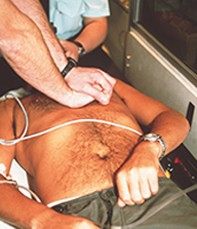Peer Reviewed
Emergency medicine
A lightning strike and resuscitation
Abstract
Cardiorespiratory arrest and lack of neurological response in lightning victims may be reversed by aggressive resuscitation. Resuscitation guidelines now place more emphasis on chest compression and defibrillator use.
Key Points
Over the years as a GP doing regular shifts in the local hospital’s emergency department you have met quite a few overseas graduate doctors on working holidays or undergoing part of their specialty training. Apparently some 20 to 30% of hospital resident and registrar staff are overseas medical graduates, mainly from the United Kingdom and Ireland.
One day that you are on duty becomes more stressful when one of these overseas doctors, who had been working at a neighbouring hospital, is brought in to the emergency department critically ill. The young man had suffered a direct lightning strike when leaving the sea during a thunderstorm. There is a lot of tension and emotion in the department while treating a colleague known to the staff.
Purchase the PDF version of this article
Already a subscriber? Login here.

